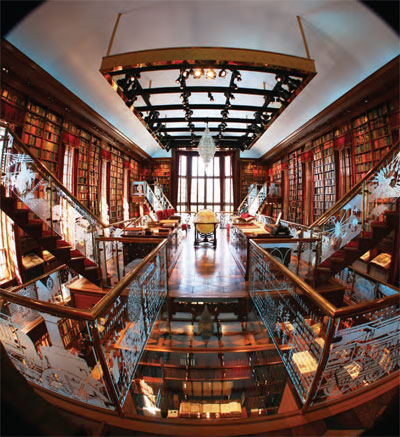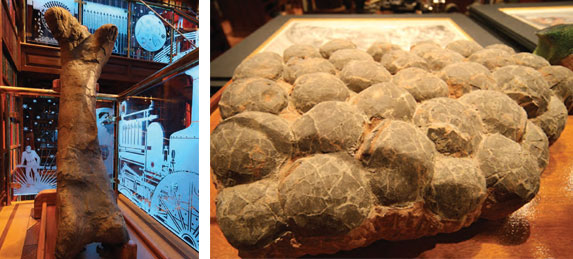Jay Walker's library of human imagination comes to campus
Jay Walker's library of human imagination comes to campus
The subject of the collection that entrepreneur Jay Walker '77 has built at his Connecticut home is, quite literally, limitless. Dubbed the Walker Library of the History of Human Imagination, the 3,600-square-foot facility houses thousands of items, from rare manuscripts to modern-day objects, that trace the heady process of scientific and artistic discovery over the course of millennia.
An original 1957 backup of the Soviet Sputnik satellite. An anastatic facsimile of the Declaration of Independence. A 1699 atlas containing the first maps to depict the sun as the center of the known universe. The complete skeleton of a juvenile raptor and a clutch of fossilized dinosaur eggs. A 1768 first edition of the Encyclopaedia Britannica. A Civil War field surgeon's kit. A flag that flew to the moon on Apollo 11. And that's just the tip of the iceberg. (Speaking of which: there's also a vintage photo of the Endurance, the ship that was frozen and crushed during the failed Shackleton expedition to the South Pole.)

The collection, Walker explains, aims to explore the evolution of human understanding about a wide variety of subjects—and to delve into the nature of imagination itself. "You can understand the history of human imagination through various vectors or lines that extend back through history," says Walker, founder of Priceline.com and chairman of Walker Digital, a privately held R&D lab. "So, one such vector might be anatomical illustration—an attempt by man to illustrate the internal parts of the human body as best he can. By looking at the history of anatomical illustration, you can see the development of how we think about the body, about the world, about color, about form, about beauty. Suddenly, a picture emerges of how we imagine the inner workings of the body—from Galen in Rome all the way through the modern MRI."
This summer and fall, visitors to campus will get a taste of Walker's collection; starting Reunion weekend, Kroch Library will host an exhibit of dozens of its items, including the backup Sputnik, a World War II-era Enigma code machine, a cuneiform cone from 2000 BC, a leaf from a Gutenberg Bible, the original crystal ball from The Wizard of Oz, an IBM punch card, and first editions of works by Edgar Allen Poe, H. G. Wells, and James Joyce. "It's a unique collection that's grounded in such a passionately held idea," says Kroch exhibition project manager Jillian Piccirilli '08. "Mr. Walker is so excited about the notion of imagination and its role through history—but also its contemporary relevance, especially to students."
In addition to the Kroch exhibit—which kicks off with a talk Walker will give in Milstein Hall auditorium on Thursday, June 7, during his 35th Reunion—several satellite shows will be mounted on campus and beyond. Mann Library will show an early color-illustrated guide to marine life; the Johnson Museum will display a medieval illuminated manuscript known as a Book of Hours. Outside President Skorton's office in Day Hall, items from the Walker Library will be paired with those from the University's holdings—for example, a Rorschach ink blot next to a specimen from the Cornell Brain Collection. And the Declaration of Independence facsimile—one of just two made through a method that creates highly accurate copies but damages the original—will be on display at the Tompkins County Public Library downtown.

Will Walker—whose home office is in the library—miss the items he's loaning for half a year? "They aren't like pets or children," he says. "Yes, I'll miss them at some level. But there are wonderful things that will fill their place for the time being, and when they return, the collection will be redone yet another way. The room is never static; it's always changing. I'm always taking things out and putting things away."
— Beth Saulnier
{vimeo}22094057{/vimeo}
Tour the Library (4:13)


